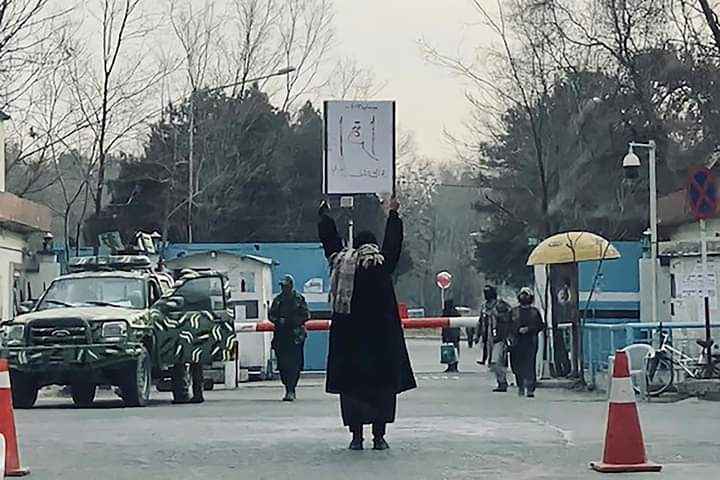Photo: Afghanistan, Kabul, a woman stands in front of the door of the university holding a placard that reads “Read.” This refers to the first verse of the Quran, which was revealed to Muhammad, the Prophet of Islam.
First, I want to bring your attention to ongoing chemical attacks on students in Iran. The authorities yet remain silent. After the Persian New Year holiday hiatus, reports of chemical attacks on Iranian school girls are once again being reported and in the past few days and today, dozens of girls’ schools in various cities have been chemically attacked.
Islaic regime authorities announced on March 7, the first arrests linked to a series of mysterious poisonings of schoolgirls across the country. “A number of people have been arrested in five provinces and the relevant agencies are conducting a full investigation,” said Iran’s deputy Interior Minister, on state television. However, the attacks are continue.
Various associations of teachers and parents as well as the Council of Teachers of Iran have condemned these attacks and demanded that the authorities to take an action.
Videos from the Telegram channel of the Coordinating Council of Teachers’ Associations, and The Free Union of Iranian Workers
At the same time, in several universities today, students held protest rallies to protest against the government’s strict restrictions on women. For the past few days, the news and statements by various Iranian officials have been focused on the issue of women’s hijab. Their positions indicate the severity of the treatment towards women who protest against the mandatory hijab.
In recent months, a significant number of women have taken to the streets and public places by removing their headscarves and mantles to protest against the forced clothing. However, some citizens have not reacted to the change of clothing, as if a change in government policy is imminent. Nonetheless, some women believe that increasing pressure and threats from the government will not lead to any positive outcomes.
Simultaneously, student protests against the imposed restrictions are on the rise. These restrictions include harassing women who do not follow the University Islamic dress code, or they wear make-up or colorful clothes.
Some media in Iran report that more than 75 students have been banned from entering the university and participating in classes for participating in the protests against the murder of Mehsa/Zhina Amini and protesting the restrictions on women in the university.
Now, coming to what I wanted to tell. I came across a report by ISNA last month that addressed the issue of women’s educational restrictions in Afghanistan and the possibility of government aid from Iran, which was published three months ago. According to the report, Iran’s Students News Agency interviewed members of the Education, Research, and Technology Commission of the Islamic Council about the Taliban’s restrictions on women’s education.
One parliament member stated, “If the Taliban disregards human rights recommendations and does not support women’s education, our country’s universities have the capacity to assist them.”
Another member of the same commission noted that “while helping women who are deprived of education is a good thing, priorities, facilities, and existing conditions must be taken into account. Continuing education should be available to a certain extent, and the cost of education for these women should not rely on public funds. Private universities could be one of the main options to continue their education.”
It is important to mention that these comments come from individuals who are currently facing strong criticism regarding the privatization of education in Iran. It is a strategy that serves the interests of the wealthy and powerful, while undermining the quality and accessibility of education for the majority of people.
A professor at Kabul University ripped his diplomas apart on live television to protest against the ban on women attending university imposed by the Taliban.
The professor’s gesture, which was described by women on the internet as a “solidarity act,” was first aired on TOLOnews, a news TV channel based out of Kabul.
In the video, the man, identified as Ismail Mashal, says that his country is “no place for an education.”
In Iran, the government has been promoting the privatization of education for years. This has resulted in a significant deterioration in the quality of education, and widespread protests by teachers and students. The government’s vision of education is focused on profit rather than the needs of students and teachers. The government’s actions in the last few years have shown that they prioritize profit over the well-being of the students and teachers in the country. As a result, the education system has become a battleground between the interests of corporations and the needs of students.
The protests from the country’s teachers in recent years and months highlight the negative effects of the authorities’ money-oriented vision on the education system. Despite this, they speak of Islamic generosity, but then emphasize the importance of private sector involvement.
While Taliban deny education to women in Afghanistan, the Islamic Republic of Iran may permit them to receive study visas and attend private schools and colleges, as long as they can afford it.
The Islamic regime’s offer to allow women from Afghanistan to continue their education in Iran is a hollow gesture that does nothing to address the root cause of the problem, which is the Taliban’s restrictions on women’s education. Instead, the government is using the situation to advance its own interests while turning a blind eye to the attacks on its own students.
This generosity towards women from Afghanistan is nothing but a façade, a way for them to appear benevolent while continuing to prioritize profit over education. Allowing Afghan women to study in private universities and colleges is not a solution but a way for the government to offload the cost of education onto individuals and families.








